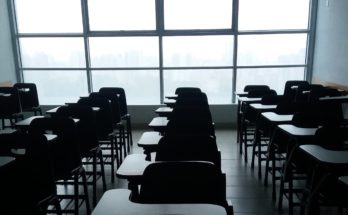The nation will be in trouble if students lose touch with their responsibilities as citizens, Joel Klein cautioned during a panel discussion on civic education at 92nd Street Y on Wednesday night. In a new campaign for him, the former city school chancellor emphasized the need to encourage students to understand how the government works.
“If you take a country for granted, pretty soon it’s going to start to erode on you,” said Klein, who is now the CEO of Rupert Murdoch’s News Corp.’s education division. “And we’re taking this country for granted.”
Nationally, three-quarters of high school seniors who took the national civics examination last year could not explain basic government facts from Congressional powers to foreign policy, the New York Times reported, based on results from a test administered by the Department of Education.
“We lost sight of the purpose of education,” said Iris Chen, the CEO of “I Have A Dream” Foundation, which helps low-income students pursue higher education. “We’re so worried about getting them caught up, that we’re not thinking about them as future leaders of our country.”
Chen, who also served as Teach For America’s NYC executive director, admitted that many top school reformers have realized that they’ve had a narrow academic focus, especially because it’s difficult to measure social participation.
The panelists, however, agreed that grassroots movements like Occupy Wall Street show that young people want to become involved. Juan Williams, a political analyst for Fox News, said that the Occupy protest is a sign of a healthy democracy. Now educators “have to start to talk about civics in a very real way,” so that young people can understand why people protest about government accountability, he told the audience at 92Y.
“It’s exciting to learn how the system really works because that impacts your life,” Williams explained. If students have a greater sense of civic responsibility, he said, they’ll take school more seriously.
Part of the decline in participation results from students who are unable see the benefit of democracy, said Seth Andrew, the CEO of the Democracy Prep charter network in Harlem. Democracy Prep, founded on “no excuses” principles, became the city’s first charter school last fall to replace a failed charter school. Andrew noted that students who attend failing schools and lack access to resources may not understand how the government affects them, which is why they become disengaged.
“The first thing our school system has to do is to introduce choice,” said Andrew, who wore a suit and his trademark orange baseball cap. Giving families the opportunity to attend the school of their choosing may motivate students because it shows that they can change their options.
Both Andrew and Williams contributed to “Teaching America: The Case for Civic Education,” a collection of essays on the crisis in citizenship among American youth. Other contributors include former Supreme Court judge Sandra Day O’Connor.
Klein’s appearance at 92Y’s event coincided with the release of his report on the crisis of the American public education system, which he co-authored with Condoleezza Rice, the former Secretary of State. “Successfully educating our young people about our country, its governmental institutions and values – what is sometimes called ‘civics – is crucial to our coherence as a population and for informed citizenry,” Klein wrote, along with Rice, in an opinion editorial on CNN’s website. As Mayor Michael Bloomberg’s first appointed schools chancellor, Klein helped oversee the dismantling of 32 elected school boards, replacing them with appointed councils that many argue offer less opportunity for meaningful civic participation, not more.
Klein didn’t mention the report, which was published on March 20, during the panel discussion. Instead, he focused on the responsibility that parents have when it comes to teaching their children. Young people who want to become actively involved must learn how to engage without taking things too far such spewing personal attacks or threats, the former chancellor said, referring to an Occupy protester’s recent Twitter threat against the NYPD.
But parents alone can’t solve the crisis of citizenship, Williams pointed out. The media also plays an important role in promoting social responsibilities. Students aren’t part of the political process because they are too caught up with idolizing celebrities and sports stars. “If media was to play a more effective role in civic education,” Williams said. “It would be explain how things are and to make it more exciting.”
Regardless of how educators plan to teach students about democracy and citizenry, Andrew said, the learning process must begin at an early age.
“The answer for civics starts in kindergarten.”




My name is Brenda Brazell a proud parent of a child with a disability in special education who attend Democracy Prep Endurance ( Charter school). when I receive a letter stating that she was accepted to this school I believe that it was a wonderful opportunity for Ashley Gonzalez my daughter. Then I received a phone call for a meeting with the social worker and the principle when i was told that my child would be held back a year because she was not challenge academically in regular. . My child has made great strive since the beginning of the year but she is not working like a child without an IEP. Ashley learn different at a slower pace. Ms Marrer continue to place my child in the same level as a child without IEP and there are no provision with teaching made for children with disbility. Ashley received services outside the school. I believe this is unfair not to correlate with their IEP regarding the percentage of progress according to their IEP. The first trimester I asked if her accommodation that is on her IEP fellow and they were not .The state exam are coming soon and Ashley”S will have to pass both math and reading which understandable but have commendation that are on IEP been exsecuted for her ? Can Democracy prep enrolled children with special needs and teach them as if they are not ? Is this legal to compare them with children without IEP and penalized a child because they have a disability by same standard in grades and testing ? Ashley grades are 69% she still fail because passing is a 70. I feel so powerless as a parent when I brought this to the principle attention. I was told that I have a option to take my child out the school. Why was she accepted in this school ? the boucher stated ” children with IEP are encourage to apply. Can you help me and my child.
Brenda Brazell
( 718)901-1007
( 646) 670-7269